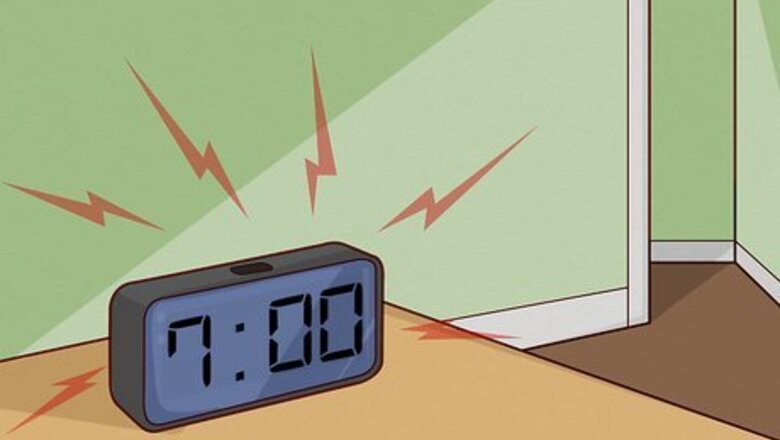
views
Put your alarm across the room.

Place your alarm far away so you can’t hit that snooze button. Setting your alarm on the other side of your bedroom can keep you from instinctively tapping the snooze button over and over again. Plus, this will force you to physically get out of bed in the morning to turn it off. Try placing your alarm clock or phone on a dresser, bookshelf, or windowsill. Make sure the alarm is loud enough so you can hear it from your bed.
Use a wake-up app.

Apps like Alarmy make you think and move in the morning. If you’re prone to falling back into bed even after getting up, try downloading a wake-up app. Unlike regular alarms, these apps need a specific task to turn them off. You might need to solve a math problem or do 20 jumping jacks. Either way, getting your mind and body moving can help you wake up faster. Wake N Shake makes you shake your phone persistently before the alarm turns off. Carrot will ask you to shake, pinch, or flip the screen. Alarmy makes you take a picture of something specific. I Can’t Wake Up! gives you a puzzle to solve.
Let light into your bedroom.
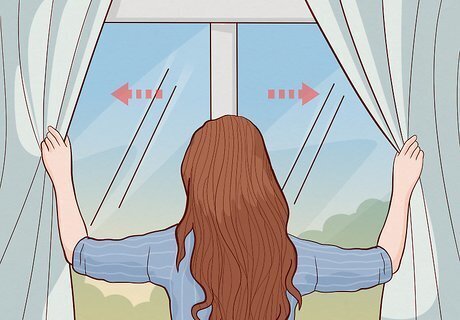
Bright light can help you feel more alert in the morning. Turn on the lights or open the curtains or blinds as soon as you get out of bed. This will help your eyes adjust and motivate you to start your day. If you wake up before the sun and don’t trust yourself to turn on a light, invest in a natural alarm clock. These mimic the light of a rising sun to fill your room with “sunshine" gradually.
Drink a glass of water when you wake up.

A cup of water can give you an instant boost of energy. If you tend to be groggy when you first wake up, try drinking a glass of water. This helps rehydrate your body after a restful night and helps you wake up. Leave a glass of water on your bedside table the evening before, or head to the kitchen first thing in the morning. Along with this, a cold morning shower can also help you wake up.
Establish a bedtime routine.
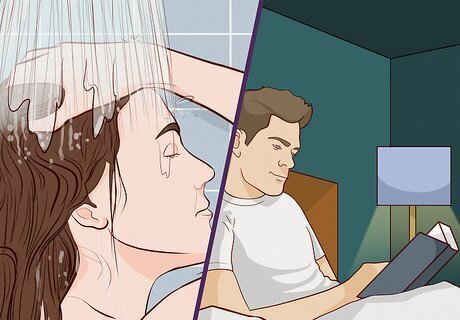
Having a regular sleep routine can make waking up easier. Create a bedtime schedule you can stick to every night. For instance, brush your teeth, shower, read, and set your morning alarm. Do what you can to wind down at a specific time to get yourself into the habit of falling asleep at a set time. Aim to go to bed and wake up at the same time every day, even on the weekends. Sticking to a regular routine trains your body to fall asleep and wake up more easily.
Prepare for the following day.
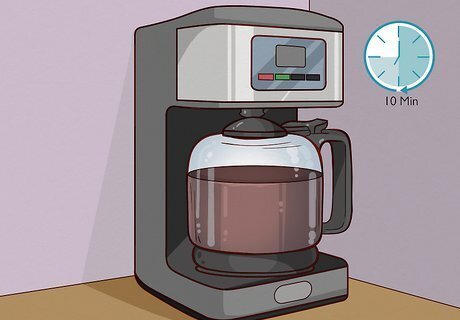
Being ready for the morning helps you follow a routine when you’re tired. Maybe you have a hard time getting up in the morning because you don’t want to leave the comfy sheets and start mundane activities. Well, prepping for comfort and ease can help wash away that annoyance. Try doing some of these things to make your mornings easier: Put your coffee pot on a timer to start brewing coffee the minute you wake up. Hang a robe near your bed to slip into after waking up. Place slippers at the end of your bed to keep your feet warm. Program your alarm to play a motivational morning playlist to energize you.
Make morning plans.

You’ll be more motivated to get up if you have things on your to-do list. Plan something fun or exciting for your day. Maybe that’s a scheduled workout with a friend or a coffee date. No matter what the occasion is, the anticipation will help you stay on top of your morning routine. Consider scheduling doctor’s appointments or work meetings in the morning hours as well. Put together a to-do list for the next day before you go to bed. This way, you’ll fall asleep knowing what needs to get done. Your plans can even be as simple as washing the dishes or tidying your room.
Take melatonin before bed.
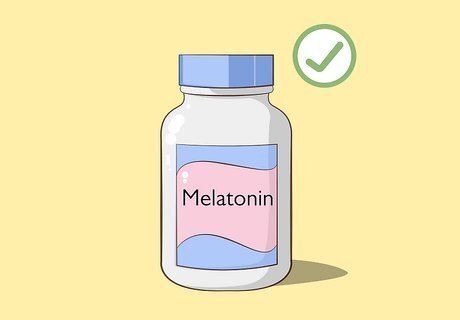
Melatonin helps promote sleep so you can rest easy. Waking up can be even more challenging if you don’t get a good night of sleep. If you have trouble falling asleep, consider taking a melatonin supplement a few hours before bed. Your body naturally produces melatonin, and the extra dose can help you feel drowsy. Melatonin is a great option for those who have insomnia, as it safely induces sleep using natural ingredients. If you’ve been using melatonin for 2 weeks and haven’t noticed a difference in your sleep patterns, stop taking it and see a doctor. If you’re pregnant, breastfeeding, or have an autoimmune disorder, ask your doctor about taking melatonin before using it.
Try to sleep 7 to 9 hours each night.

Getting the right amount of sleep can help you feel refreshed. If you don’t sleep well, you may be more inclined to stay in bed than get up in the morning. Experts recommend getting at least 7 to 9 hours every night to feel your absolute best. For instance, if your alarm goes off at 7 AM, aim to close your eyes by 11 PM.
Turn off screens 1 hour before bed.
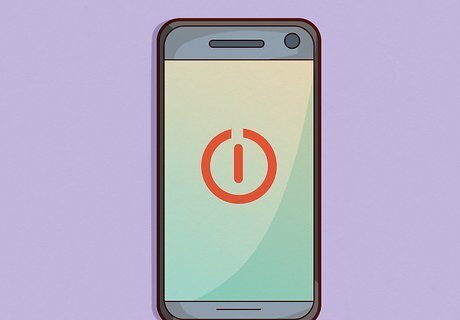
The light from your phone can make it harder to fall asleep. Believe it or not, scrolling through Twitter or watching a movie isn’t the best way to wind down. Using technology right before bed stimulates your brain and delays REM sleep, making it harder to fall asleep. So, set your phone aside and turn off the TV for at least 1 hour before bed. Try unwinding by reading a book or listening to a podcast instead.
Cool down the room.

The ideal sleeping temperature is between 60–67 °F (16–19 °C). Making the perfect sleeping environment can help you stay asleep and wake up easily. Experts recommend keeping your bedroom cool, so your body doesn’t get uncomfortably hot or cold throughout the night. Set the room based on your preferences and notice the difference it makes.
Exercise during the day.
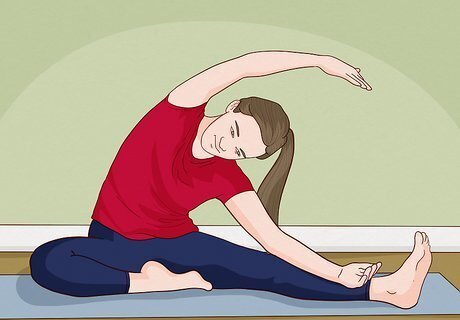
Regular physical activity can help you sleep better. If you have trouble getting up in the morning, it may be because you had a restless night. Moving your body throughout the day helps you unwind and drain your energy for sleep. So, do an at-home workout, go for an afternoon walk, or do stretches after dinner. Avoid exercising too close to bedtime, as the extra adrenaline and endorphins can make it harder to fall asleep.
Eat a healthy meal in the evening.

Going to bed with an upset stomach can make it harder to fall asleep. If you want to get up easier in the mornings, take care of your body. Right before bed, do not drink caffeine, alcohol, or eat anything too heavy or sugary. Instead, go for something lighter such as a salad or chicken noodle soup. This way, your body can digest better, and you won’t be wired or have acid reflux when it’s time to sleep. As a general rule, stop eating 3 hours before bed. Focus on eating a light and nutritious evening meal with fruits, vegetables, and/or proteins.

















Comments
0 comment